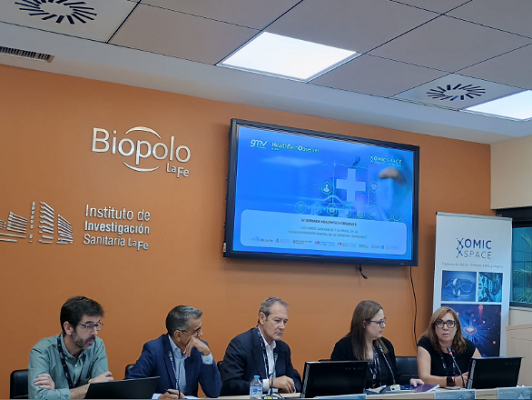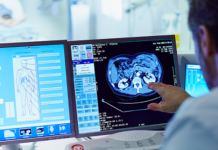
The 4th HealthTech Observer (HTO) Workshop took place recently at the La Fe Healthcare Research Institute (La Fe IIS), and it served as a showcase for presenting OmicSpace, a groundbreaking project that is creating a biomedical federated data space for clinical and healthcare research in Spain.
OmicSpace is a continuation of the earlier TARTAGLIA project, which was led by GMV, and which demonstrated the potential for using artificial intelligence (AI) with federated data networks applied to research. Now, with the La Fe Healthcare Research Institute taking the lead, and with collaboration from leading Spanish institutions, the new project is emerging as a driver of transformation on the path towards personalized medicine.
An institutional project with an impact throughout Europe
OmicSpace securely integrates clinical, genomic, and biobank information, in order to transform complex biomedical data into applicable clinical knowledge. The project is following European standards and applying FAIR principles (Findable, Accessible, Interoperable, Reusable) for the data involved. The aim of the project is to promote secure and ethical sharing of information among a variety of nodes established in Spain, as a way of accelerating diagnostics and personalized treatments.
In her introduction to the event, María José Carrión Martínez, Manager of the La Fe Healthcare Research Institute, emphasized that OmicSpace is “an institutional project created with the goal of transforming biomedical research and improving the lives of patients and professionals alike.” In turn, José Luis Poveda, Manager of the Valencia South Interdepartmental Healthcare Group (ASI) explained that the project will make it possible for doctors “to make decisions with increased certainty, while protecting data and giving patients confidence.” He added that “OmicSpace is a beacon that is shining not only for the Valencia region and for Spain, but for all of Europe as well. We’re proud to be laying the foundations for a more fair and human-centered approach to health.”
The opening keynote address was delivered by María José Tarazón, Deputy General Director of Health Technologies for the regional government of Valencia, who introduced the Digital Transformation Strategy 2024‑2027.
“Healthcare data will be at the center of the reform of the system, as a driver of collaborative research and personalized medicine,” she said. She described OmicSpace as “a flagship project that will require us to unify our data and redesign the existing healthcare and patient relations model.”
The value of networked data: benefits for patients in the Galicia region in four years
During the event’s first panel discussion, Inmaculada Pérez, Manager for Digital Health at GMV, explained that projects like OmicSpace, together with the European Health Data Space (EHDS), “will make it possible to start using the data of over 450 million European citizens, while also accelerating scientific discovery through the use of AI, promoting equality among researchers, and transforming the way in which we diagnose, treat, and relate to patients.”
She emphasized the need to create AI offices and data offices at hospitals, as catalysts for the new healthcare model, staffed by multidisciplinary professionals.
Next, María Eugenia Gas, a researcher at the La Fe Healthcare Research Institute and coordinator of the OmicSpace project, explained how tools like u‑Tile, created by GMV and already tested during the earlier TARTAGLIA project, allow for networked training of algorithms without the need to centralize data. “This lightens the regulatory burden, reduces costs, and ensures data quality during research,” she added.
Carlos Alonso Peña, a division manager for the Directorate-General of Data at Spain’s Ministry for Digital Transformation, highlighted the ways in which Spain’s 17 autonomous regions have collaborated in order to create the country’s National Health Data Space. “We’re no longer talking about a data lake. Instead, we’re making the information accessible and generating functional data spaces, with an initial investment of €47 million.”
The discussion also addressed some of the existing financial challenges. Javier Quiles, Deputy Director of Systems and ICT at the Galician Health Service’s Santiago de Compostela and Barbanza Healthcare Area, pointed out that “financial governance is as important as doctors and medicines.” He confirmed that within a timeframe of 4 to 5 years, patients will be able to benefit from data-based precision medicine.
The workshop’s second roundtable discussion featured experts from a variety of institutions who are participating in the OmicSpace project. They described some of the challenges they are currently facing, as well as the opportunities being offered by GMV’s technological deployment:
- José María Millán Salvador, La Fe Healthcare Research Institute
- Jesús María Hernández, Salamanca Biomedical Research Institute (IBSAL), and President of the HARMONY Alliance Foundation
- Joaquín Dopazo, Andalusia Progress and Health Foundation
- Laura Puente, Aragon Institute of Health Sciences
- Fernando Martín, La Paz University Hospital of Madrid
- Miguel Ángel Moreno, Ramón y Cajal Hospital
- María Brión, Xenoma Galicia project
Another speaker who made a significant contribution was Fernando Martín Sánchez, who reminded the attendees that “data can help us save lives.” He also stressed that when rare diseases are involved, we have to understand that every patient is unique, and so is their illness, because each person is an individual.
Collaborative efforts among Spain’s autonomous regions
The workshop’s closing address was given by Juan Fernando Muñoz, General Secretary for Digital Health, Information, and Innovation at Spain’s National Health Service (SNS), who explained the key aspects of its Digital Health Strategy. He emphasized the need to enhance the system’s sustainability in view of the country’s aging population, the increase in chronic diseases, and technological pressures.
He detailed the lines of action that must be taken in order to apply health technology to address these challenges, and he explained how Spain’s Secretariat for Digital Health is acting as a centralizing body to coordinate the work being done by the country’s various regional health systems. This approach was developed during the COVID‑19 vaccination campaign, and it led to some important initiatives such as the regulation of artificial intelligence and creation of the European data space. All of this has made it necessary to “arrive at a consensus, with solid Spanish leadership,” and he highlighted the efforts that have been dedicated to making these initiatives a reality.
The HealthTech Observer and La Fe Healthcare Research Institute: health alliances for the digital era
The HealthTech Observer (HTO) event was first promoted by GMV in 2023, as a forum for knowledge to accelerate the implementation of digital health technologies and make progress towards a more personalized, patient-centered approach to medicine. The four editions of the event held so far have featured participation by leaders from the fields of clinical innovation, biomedical research, and healthcare technology. The La Fe Healthcare Research Institute is a leading Spanish institution for biomedical research, which integrates the La Fe University and Polytechnic Hospital in the city of Valencia, the University of Valencia, Valencia Polytechnic University, the La Fe University and Polytechnic Hospital Foundation, and the Valencian Infertility Institute (IVI) Foundation. Its mission is to bring together resources and knowledge to promote projects that will have an impact on the health of the entire population.











